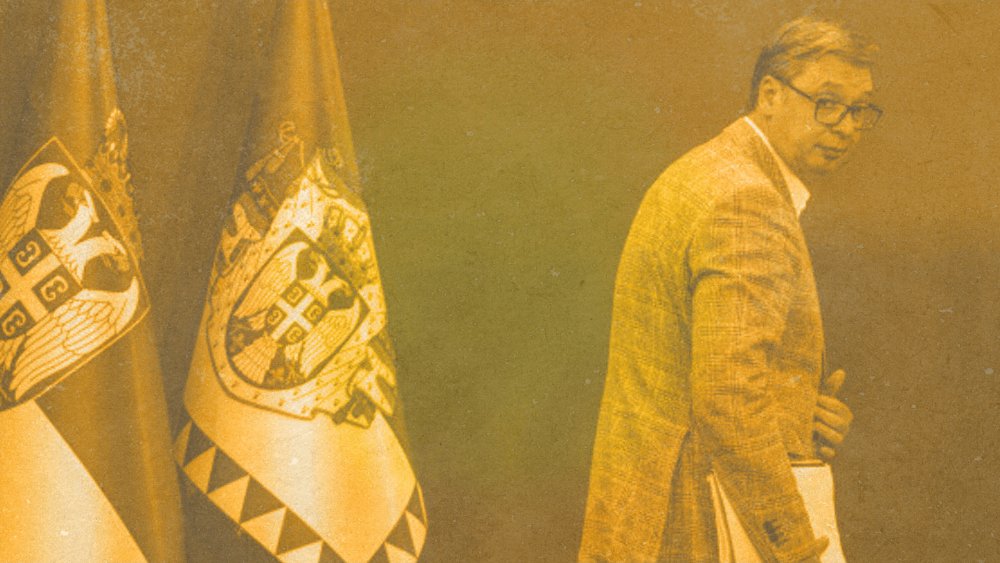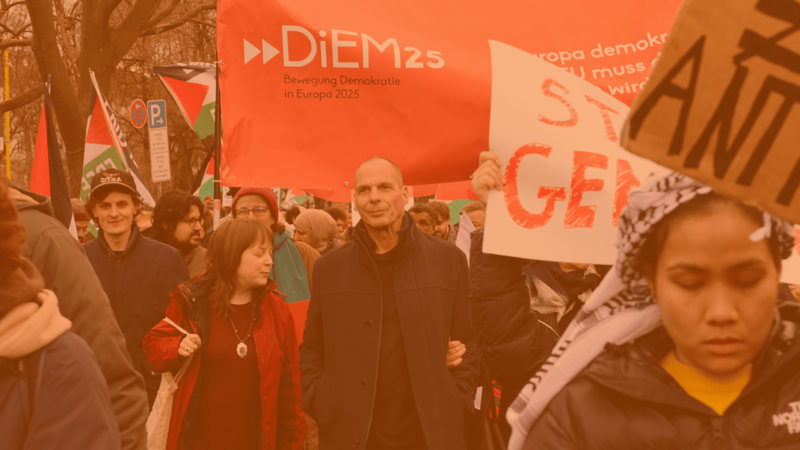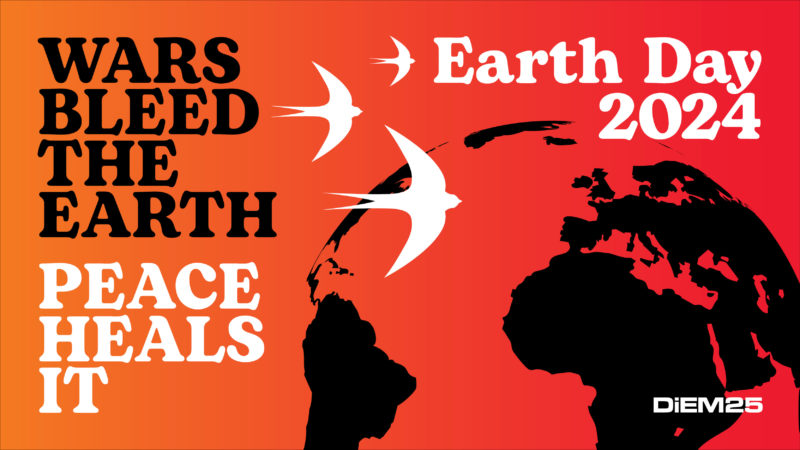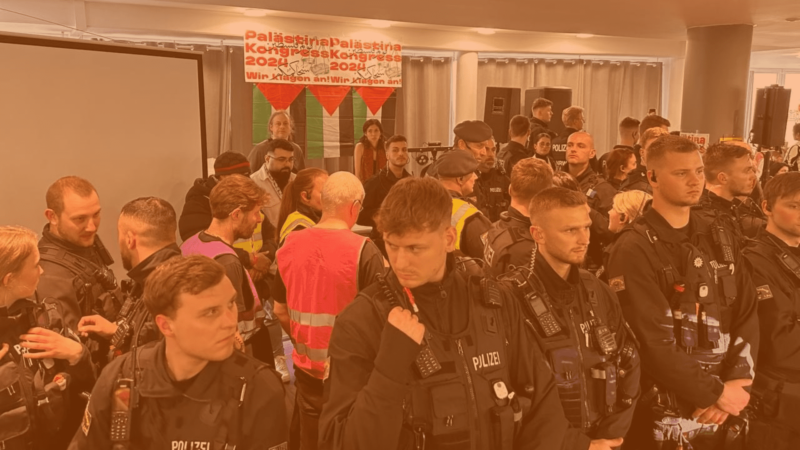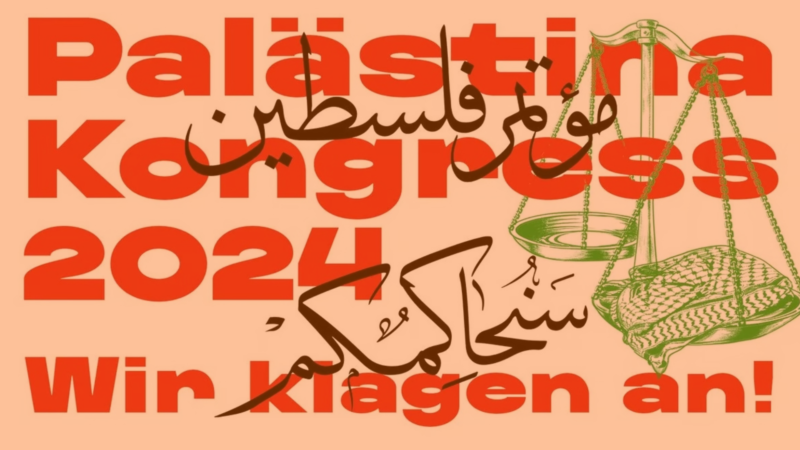In February 2012, my playwright colleague Milan Marković and I joined seven leading political parties in Serbia three months before the presidential elections, symbolically witnessing the fall of the democratic government in favour of the Serbian Progressive Party. Many now consider this the beginning of the end of democracy in Serbia, as Aleksandar Vučić‘s autocratic rule gradually worked over the last decade to undermine all state institutions and almost completely destroy freedom of press.
Milan and I, as young artists at the beginning of our careers, embarked on this artistic endeavour in 2012 because we wanted to highlight the problems of parliamentary democracy and demonstrate how partocracy and nepotism were present in all political spheres, whether on the liberal or right-wing spectrum – we cannot speak of the left because a true left party did not exist in the political scene then.
The most interesting part of the project was when we presented the text named ‘Idea-Strategy-Movement’ to all party colleagues, outlining our view of political marketing, which was actually Joseph Goebbels‘ text ‘Knowledge and Propaganda’ from 1928. All parties reacted very positively to the text, and the Liberal Democratic Party even featured it on the front page of its website, while the Serbian Progressive Party invited us to read the text at their pre-election rally. We described all the experiences we had during the three-month pre-election campaign in seven political parties in the project ‘They Live‘, which was premiered at the ‘Dom omladine’ in Belgrade after censorship at the Yugoslav Drama Theatre.
I am writing this long introduction because I believe that those three months in 2012 were crucial for the development of a particular form of scepticism and (justified) distrust towards political parties in Serbia. During that time, the phenomenon of blank votes or abstentions emerged which, in the elections two weeks ago, actually ‘aided’ the Serbian Progressive Party in staying in power once again.
Alongside this, there was the phenomenon of voting ‘for the lesser evil’, a practice that many abandoned, choosing instead to become abstainers. I would just add that abstention is, in addition to those who do not want to vote for the ‘lesser evil’ and those who are simply ignorant of the electoral process, often a comfortable position for the privileged and those who are not marginalised socially.
In 2012, Milan and I were among the blank voters, refusing to vote for the lesser evil. Some criticised us, arguing that by critiquing the then-democratic government and pointing out that they’re essentially all the same in some respects, we indirectly contributed to bringing the Serbian Progressive Party to power. Of course, this is amusing because, as we know, art does not have such power to influence broader societal structures.
In the meantime, Milan moved first to Sweden and then to Slovenia, joining the large group of young people who have decided to leave the country. I remained living between Serbia and Montenegro, and since Montenegrin politics, unfortunately, depends on Serbian politics in many ways, it amounts to the same thing. Consequently, I still have to think about the political situation in this region.
After ten years of this kind of rule by the Serbian Progressive Party, do I regret refusing to vote for the lesser evil in 2012? A bit, yes. But I believe it was important to show that power is changeable. Did I believe that I would be living in such a system ten years later? Honestly, no. Do I think it would be worse if the Democratic Party had remained in power?
From this perspective, I am certain that it wouldn’t be. Would I, in that scenario, vote for the lesser evil instead of issuing a blank vote? Absolutely. My belief that every democratic government must be replaceable has not changed, but what has changed is that I started to believe that if I want, as a citizen, to participate in the political decisions of my country and fight for them to be better, I must go out and vote, giving my support to a party whose political program aligns with my beliefs.
If there isn’t such a party at the moment, then I would vote for the one with the closest political program to what I believe in. Today, I would never again decide to be an abstainer, and from now until the end of my life, I will certainly participate in elections and vote in the country where I live.
But, what if I live in a country where the government has captured all institutions and violates the constitution by preventing free democratic elections? What if I live in a country where the government, realising it will lose elections in the capital city in plain view of all citizens living there, shamelessly steals elections by bringing tens of thousands of citizens by bus to vote in a place where they don’t reside? What if I live in a country where the Ministry of Internal Affairs issues tens of thousands of fake IDs to these people, and the government doesn’t even hide it, calling these elections “the most regular so far” despite diligent citizens, election monitors and observers collecting thousands of recordings, photos, and evidence clearly showing people from Republika Srpska (entity within Bosnia and Herzegovina) being transported by buses and cars to polling stations in Belgrade to vote? What if I live in a country where the government similarly buses Serbian citizens to vote in Montenegro where they don’t live, using the same means to influence the government of a neighbouring sovereign state? What if I live in a country where the government uses our tax money to bribe, blackmail, transport, and bring people as needed just to stay in power? What if I live in a country where the prime minister of a sovereign state states that Russian intelligence services have provided them with information about protests in Belgrade? What if I live in a country that is a candidate for European Union membership, but the EU refuses to adequately respond to blatant election fraud and turns a blind eye to Vučić’s autocracy? What if I live in a country where many citizens believe that the West keeps Vučić in power to finally solve the Kosovo problem? What if I live in a country where the same Vučić, despite everything, still calls Kosovo a “so-called state” and continues to destabilise the region? What if I live in a country where I cannot rely on any institution to protect me from the Republic Electoral Commission to the Constitutional Court? What is left for us in such a country? The only option left is to take to the streets that are still free, before they too are taken away. Constant, persistent, peaceful protests against living in a country taken from us by this government.
Belgrade has a rich history of protests, starting from 1991 when people protested against the regime of Slobodan Milošević, through student and civic protests in 1996-1997, to October 5, 2000, when Milošević finally fell. We then had protests against the regime of Aleksandar Vučić with the ‘1 out of 5 million’ movement from 2018 to 2020. From May 3, 2023, after two mass shootings at the Vladislav Ribnikar school and the following day in Mladenovac, the people of Serbia protested for eight months under the name ‘Serbia Against Violence’ which later became an opposition, pro-Western ticket in the elections on December 17.
After obvious electoral fraud, the people, and this time the students, took to the streets daily, protesting in front of the Republic Electoral Commission, demanding the annulment of the elections. On December 30, a large gathering organised by the Proglas group was held, made up of artists and intellectuals, together with the opposition and students.
Despite being a people with experience in overthrowing the government through street protests, there is still a certain group of ‘sceptics’ among us. They believe that the opposition is barren, that the youth are manipulated, and that it is pointless to take to the streets and support the civic struggle for free, fair democratic elections.
They may even believe that the protesters, not Vučić’s infiltrated units, deliberately caused riots, smashed windows, and doors at the city assembly. Instead of focusing on election theft, arresting innocent students, cleaning up voter lists, and overthrowing autocratic rule, these sceptics exclusively criticise the opposition. They argue that nothing will change until there are systemic changes, that seemingly should come out of nowhere.
They prefer to repeat the discourse of the current government about the incompetence of the opposition rather than accepting the need to go to the streets and support the lesser evil, even though the greater evil threatens to engulf us and turn us into a dictatorship from which we might not be able to escape. They do not actually believe in the variability of government but wait for some ideal political party to emerge.
They are aware that this is unlikely to happen in an obvious autocracy. Unfortunately, what is currently the most barren in our society are those citizens who would rather criticise liberals than the current government. Young film director and student of the Faculty of Dramatic Arts, Siniša Cvetić, aptly described this situation in his Facebook post, where he said, “The winners of these elections are also all those who, from a realistically non-existent left position, bombarded gunfire solely at the already functionally powerless civic liberal opposition.
The mocking and derisive behaviour of the internet left through various posts, memes, and pages may have partially contributed to fewer people going out to vote, perhaps even making a difference in the city. Those who could potentially have made compromises with liberals were actually their most aggressive critics.”
To conclude, I will quote the radio host Duško Milinović, who once said: “I’m the type of leftist who, if forced to choose, fights alongside liberals against fascists, not the type of leftist who fights alongside fascists against liberals.”
I belong to those who believe that, when all institutions are taken away (parliament, police, judiciary), and you can no longer rely on them, the only thing left for you is a long, arduous, and persistent struggle through civil disobedience on the streets. We once overthrew the autocratic regime of Milošević through protests, and we will do it again. Will an ideal opposition come to power then, one that we can fully trust? Probably not. But we will at least try to regain democratic institutions and free the media, so that we can continue to sharply criticise every subsequent (changeable) government.
Do you want to be informed of DiEM25's actions? Sign up here






